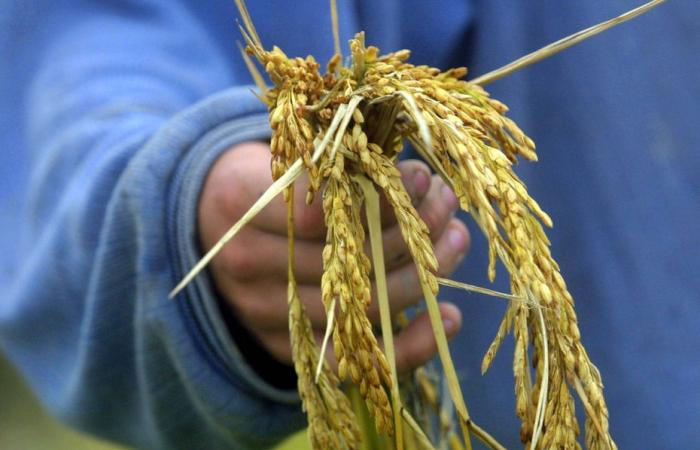A PGI and organic Camargue rice has been recalled due to its inorganic arsenic content. The president of the producing company, Biosud, wants to be reassuring. He calls into question the quality of the Rhône water used for irrigation, but also European standards, which are “too strict”.
Company
From daily life to major issues, discover the subjects that make up local society, such as justice, education, health and family.
France Télévisions uses your email address to send you the “Society” newsletter. You can unsubscribe at any time via the link at the bottom of this newsletter. Our privacy policy
It is usually found in bulk, on the shelves of Biocoop stores. A batch of round, semi-complete Camargue IGP rice, from the Biosud brand, was recalled on October 31 and should not be consumed. A one-off analysis by state services revealed non-compliant inorganic arsenic content. Of the “metallic traces (heavy metals: lead, mercury, cadmium, etc.) were detected in this rice, which was immediately removed from the shelves.
What does this contamination represent? And above all, how can we explain that French rice from organic farming could be affected? The president of the Biosud company, Marc Thomas, is not “not surprised.” It makes a direct link with the quality of the water used for rice growing, but also with the tightening of European regulations.
“This contamination is not astonishingimmediately assures Marc Thomas. Arsenic is a heavy metal, which has been present for a very long time in the Rhône. Its presence can be explained by the industrialization of the river over many years.”.
However, the Rhône constitutes the only water supply for rice fields in the Camargue, he explains. “In our area, the river is essential for rice farmers, the water is pumped directly there. from the moment we have an element that we cannot control, the water of the Rhône, we have no power. We follow the analyses, that’s all.”
The president recalls that his company follows an analysis plan “extremely complete” every year. “We carry out several hundred analyzes at all levels, in the fields, in our silos, then we analyze the farmers’ samples… We are going to carry out second opinions to see if this contamination is real”.
As the World Health Organization points out, arsenic is a natural component of the earth’s crust, and “very widely present in the environment”. He is “very toxic in its inorganic form”, classified as carcinogenic to humans (group 1) by the International Agency for Research on Cancer. It is this form which was found in Camargue rice.
For Marc Thomas, the quantity is too small to be dangerous: “We should not panic, the rate found in this batch is extremely low, certainly, above the authorized limit, but extremely low.”
This presents absolutely no danger to the health of consumers, even children.
Marc Thomas, president BiosudFrance 3 Provence-Alpes
“It’s a minor problem, no one can say, or prove that over the last 40 years, only one person has been contaminated by arsenic”he continues.
Another factor may explain this unprecedented recall of Camargue rice. The president of this traditional family farm emphasizes that the recalled batch comes from the 2023 harvest, a year marked by a particularly severe drought, particularly during the summer. Which may also explain the higher arsenic levels.
“The drier the weather, the more we can find, because the Rhône is lower. This was the case last year. Obviously, we pump closer to the bottom. However, heavy metals are located at depth.”
For rice cultivation, water is usually pumped into the 1 meter below the surface, or 1.50 m. But this could change due to arsenic pollution. “We are trying to see with the producers if we can pump the water even more to the surface.”
For 2024, Marc Thomas wants to be reassuring. “This year has been particularly rainy. We are in full harvest, the first analyzes show a very low arsenic content.”
Concerning the type of rice affected by this recall, no surprise either for the business manager. “Semi-whole or whole rice is less scraped rice than milled rice. This allows it to retain its nutritional properties. However, the more we scrape the rice, the less arsenic we find, because it is found mainly in the husk rice, outside the grain.
We have been working organically for 40 years. Organic has developed a lot using the argument that whole or semi-whole rice is better for your health than white rice.
A laudable choice, but one that could be called into question in future years. “If the standards remain the same, we seriously ask ourselves the question: are we not going to stop producing whole and semi-whole rice and only keep milled rice?” This is to remain in compliance with regulations, but, paradoxically, to the detriment of the nutritional qualities of the rice.
“We have tried all these years to set up a reliable sector, it’s a shame”, regrets Marc Thomas.
Biosud has belonged to the Thomas family since 1906. For his part, Marc has been at the head of the company for around forty years and assures us: “This is the first time that Biosud rice has been recalled.” And for good reason. “There were no regulations for arsenic until five years ago.”
Since March 2023, the European Union has set a maximum threshold of 0.15 milligrams of arsenic per kilo of semi-complete rice, such as milled rice. It was 0.25 mg previously.
“For us, this is the main problem. The standards set by bureaucrats in Brussels are too low. They do not make sense. However, in the long term, they could put an end to French rice growing.”
“We have had no explanations regarding these standardshe regrets. It’s an aberration. We are tied hand and foot.”






